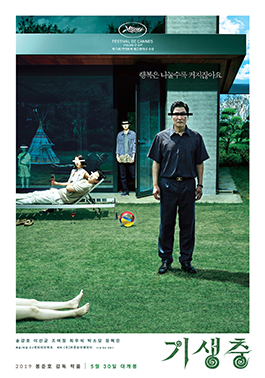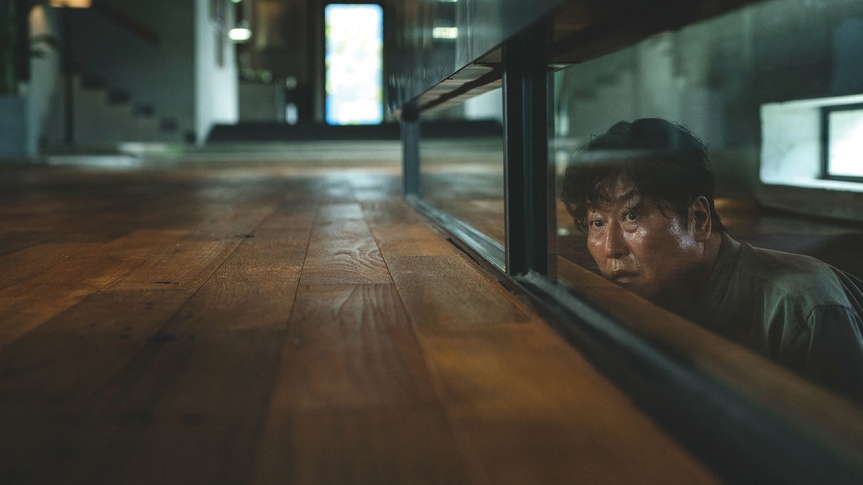 Bong Joon-ho’s best film to date is a masterclass in both black comedy and social commentary.
Bong Joon-ho’s best film to date is a masterclass in both black comedy and social commentary.
“Hell, if I had all this money, I’d be nice too!”
I can’t even remember what I was going to write for the introduction to this film before yesterday. Something about how the divide between high- and low-income families is a universal topic that transcends our cultural and cinematic differences. Damn near everyone has felt that belt tighten, that dread and stress from looming payments and … well, it was apparently universal enough to win Best Picture at the Academy Awards, making it the first ever foreign language film to do so. Not that it wasn’t inevitable that this would happen: with the three juggernauts Park Chan-wook, Kim Jee-woon and Bong Joon-ho making consistently excellent, internationally-renowned films it was bound to happen sooner or later – and Parasite is easily Bong’s best feature to date.
Co-written with seeming unknown Han Jin-won, Parasite deals with the Kims: a poor family consisting of father Ki-taek (Song Kang-ho), mother Chung-sook (Jang Hye-jin), son Ki-woo (Choi Woo-shik) and daughter Ki-jeong (So-dam). They work temporary jobs which do little to help their endlessly shitty financial situation: they live in a semi-basement flat and poach WiFi from an upstairs neighbour. Things start to change, however, when one of Ki-woo’s friends (Park Seo-joon) who has been working as a private English tutor to the daughter of the wealthy Park family, suggests Ki-woo take over as he’s about to go study abroad.
Ki-woo finds out that the mother (Cho Yeo-jeong) is a bit naïve, and is able to fool her into thinking he’s a university graduate capable of teaching English to Da-hye (Jung Ji-so) – with whom he starts a secret relationship. He also learns that the younger son (Da-song) needs an art tutor, and convinces his sister to pretend to be an in-demand, high-profile artist and from there the scheme snowballs, with plans put into motion to fire the father (Park Dong-ik)’s driver and lose longtime maid Moon-gwang (Lee Jung-eun). The Kim family encroaches more and more on the Park family, but things soon begin to get out of control.
There’s a lot to unpack here, despite the relatively simple premise. The film is split into two, basically, with the first half of the movie consisting of the family slowly infiltrating this wealthy household. It’s really good stuff – a perfect mix of black comedy and heist movie – but if you’re familiar with Korean New Wave directors, you’ll know that things don’t stay that way for long. I might make the comparison again in this review, but I had such strong flashbacks to Kim Jee-woon’s wonderful The Quiet Family, in terms of the stylistic choices made by Bong Joon-ho and the way he blends thriller elements, violence and dark humour. It uses the old-school technique that made Korean cinema what it is today but gives us story that’s very prescient and also timeless.
Parasite is a film that deals in contrasts, and isn’t afraid to go a bit heavy-handed with it. Korean cinema – and especially the works of Bong – has always been imbued with reflections of present-day society, from the earliest movies during Japanese rule to the post-divide works of Ha Gil-jong all the way through to the internationally-seen megahits of today. Here, the contrasts are between the two status quos: that of the upper and lower classes in Korea. We see this best illustrated near the end when Mrs Park exclaims how she’s turning the lemons of a monsoon ruining their camping trip into the lemonade of a backyard party to Mr Kim, whose entire basement apartment was ruined by the same floods. But these contrasts are everywhere, from the grateful way Geun-sae and previous housekeeper Moon-gwang treat the Parks versus the way Kims do, to the garden-facing, walled mansion the Parks have versus the Kims’ underground hellhole with nothing but a view of a drunk neighbour pissing.
It’s not subtle, but it’s not meant to be. Bong has something to say, and says it – but he never allows it to smother the film to the point where it’s just a big, loud soapbox. He still treats it as a film, and does some of his finest technical work here. The black comedy elements almost demand that the reality is heightened to help drive the point home. Because the situation is so relatable, it’s damn hard not to root for the Kims even as they do increasingly immoral things such as the way they get rid of the driver and Moon-gwang. A lot of us have been in similar positions, where we’re willing to lower our standards in order to just pay the rent. It also helps that everyone in the picture is pitch-perfectly cast in a way that makes each character likeable in their own way. Mr Kim justifies their actions by saying that even an opening for a security guard attracts five hundred university graduates, and he’s got a point. The film further enforces that they all (well, maybe not the daughter) have doubts about the morality of what they’re doing, but sometimes it’s survival that wins.
The movie does more than just discuss the class divide, however. It talks about how tough it is just to get a job and live in the city – a feeling many young people will no doubt feel – and also how money can make you lose touch with the way the world works. Mr Kim acts shocked when he discovers Geun-sae, asking how he can live like that while completely forgetting that his own situation wasn’t much different only a few months prior. Director Bong isn’t necessarily saying that the rich here are bad per se. The Parks are a sweet family, if a bit stuck up at times (as well as dismissive of Mr Kim and his poor person smell), but they’re just extremely disconnected from the rest of the world. Bong himself stated that the title reflected not only the main characters, but the rich whose inability to do anything by themselves force them to leech off the work of the lower classes.
I’m glad this is the movie that won Bong the Oscar. As much as I enjoyed Snowpiercer and Okja they don’t compare to the smaller, homegrown works he made a name for himself making. Memories of Murder, Mother and The Host are classics, but really only the building blocks for the work seen here. Parasite uses the same framework: taking a hot topic or news story and making it his own, while never letting go of what it is he’s trying to say. This is a director with two decades of experience under his belt and it shows. He knows exactly when to lull us into a sense of security, only to have the entire theatre drenched in dreadful silence the second that doorbell rings, exactly halfway through the movie. He uses clichés to his advantage and juxtaposes the lives of the two families while knowing he can always flip everything on its head, leaving you always on your toes and giddy for more. It’s a powerhouse of simple yet effective filmmaking that will be studied for years to come. Even if you don’t care for the social commentary, you’ll be hooked on the story from start to finish. Parasite is unequivocally this year’s Best Picture and I’m glad the Academy was able to figure it out too.
Verdict: Excellent writing, directing and acting come together to make one of Korea’s finest ever film.
Overall entertainment: 10/10
Violence: 6/10
Sex: Some sofa hand stuff/10
Direction: 10/10
Voss: I’ve never so much Voss in one fridge
Casualties: I can’t quite get why this particular person died
Floods: In retrospect, you probably shouldn’t have saved that rock
——-
Parasite (2019)
Korean
Director: Bong Joon-ho
Writers: Bong Joon-ho, Han Jin-won
CAST
Song Kang-ho – Kim Ki-taek
Choi Woo-shik – Kim Ki-woo
Park So-dam – Kim Ki-jeong
Jang Hye-jin – Kim Chung-sook
Lee Sun-kyun – Park Dong-ik
Cho Yeo-jeong – Choi Yeon-gyo
Jung Ji-so – Park Da-hye
Jung Hyeon-jun – Park Da-song
Lee Jung-eun – Gook Moon-gwang
Park Myung-hoon – Geun-sae
Park Geun-rok – Yoon, the chauffeur
Park Seo-joon – Min-hyuk

